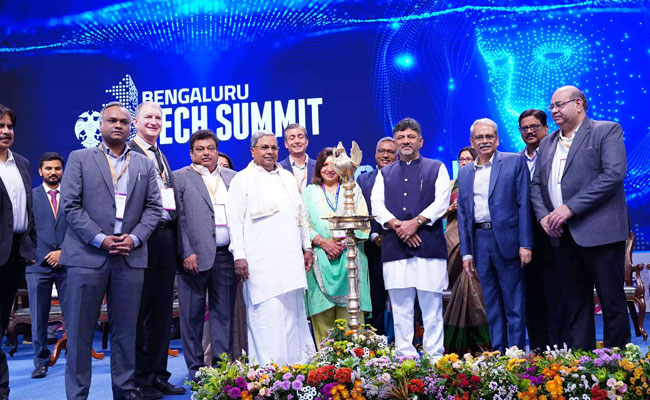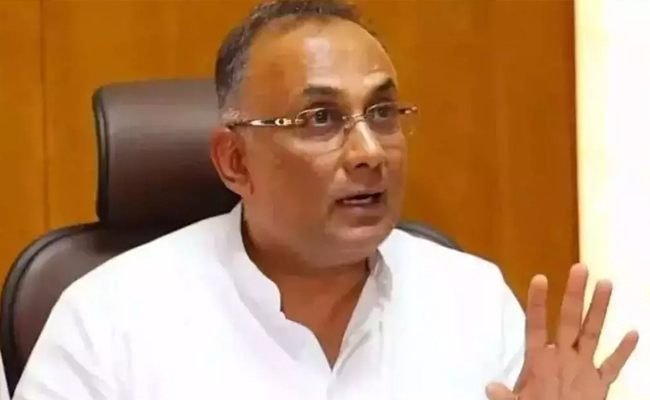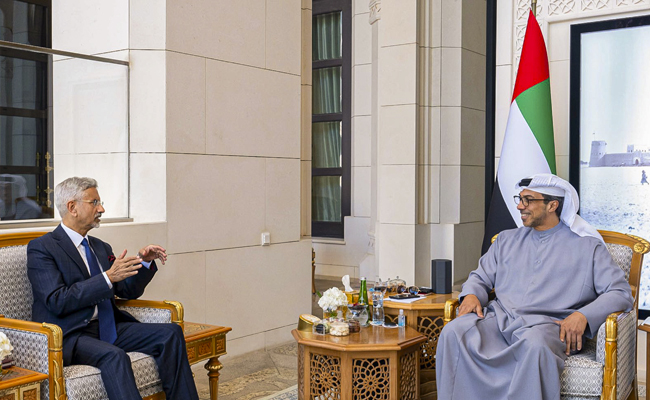Bengaluru: Karnataka Chief Minister Siddaramaiah on Wednesday said the government would unveil a revised biotech policy at the Bengaluru Tech Summit-2023, an annual global tech event which took off here.
Speaking at the inauguration of the three-day BTS, Siddaramaiah also said the state is set to launch the Animation, Visual Effects, Gaming, Comics, and Extended Reality (AVGC-XR) policy.
''As we continue to champion advancements in biotechnology, I am thrilled to announce that revised biotech policy is set to be unveiled at the Bangalore Tech Summit,'' the chief minister said. This policy revision reflects the Karnataka government's commitment to staying ahead of all and fostering growth in this critical sector, he added.
Siddaramaiah said that recognising the evolving landscape technology and creativity, the Karnataka government understands the importance of animation, visual effects, gaming, and comics.
''It gives me immense pleasure to share that the Government of Karnataka is set to launch the AVGC-XR policy -- a treatment to our ongoing commitment and progress in leading the nation in AVGC sector towards global excellence,'' he told the gathering.
Speaking about the state's contribution to the IT sector, the chief minister said Karnataka's impact on the IT landscape is nothing short of extraordinary.
He said the state is home to over 5,500 IT/ITES companies and approximately 750 multinational corporations and has been a driving force behind the sector's success, contributing around USD 85 billion to the nation's exports.
This vibrant industry has not only provided direct employment to over 12 lakh professionals, but also creates a ripple effect generating over 31 lakh indirect jobs, Siddaramaiah explained.
According to him, Karnataka's share of software exports of nearly 40 per cent of the country strengthens its position as a global IT power house.
Karnataka has become the most sought after destination for global capability centers, hosting around 40 per cent of GCCs in India. The availability of a skilled digital talent pool, a thriving innovation and startup ecosystem and a conducive policy environment have fueled the growth story of global capability centres in Karnataka.
Karnataka has consistently held the top spot in NITI Ayog's India's innovation index for the last three years and it has been recognised as the best performer in the Department for Promotion of Industry and Internal Trade (DPIIT) ranking, Siddaramaiah said.
He also said that the state government is focused on building a seamless ecosystem that attracts investment, talent, and opportunities.
Stating that his government wants Karnataka to be seen as a tech hub with an end-to-end ecosystem for innovating and growing businesses, Siddaramaiah said the pro-business policies reflect the dedication to simplifying regulatory processes.
''From affidavit based clearance to land reforms, central inspection systems, and single window clearances, each step we take is aimed at encouraging an industry-friendly environment,'' he said.
Karnataka was the first state to introduce a groundbreaking Information Technology Policy in 1997, he said, adding that this initiative made the state a cornerstone of India's economy, contributing a substantial 25 per cent to the nation's GDP.
Siddaramaiah said these policies are not developed in isolation, but are driven by collaboration between industry and academia in tandem with the state government.
Vision groups in IT, Biotech and startups comprising industry stalwarts and leaders operate as think tanks, shaping the trajectory of our state's development, he explained. Speaking about the challenges, he said the digital divide is a reality which must be addressed, ensuring that the benefits of technology reach every citizen, regardless of their background.
In this regard, he said 'Beyond Bengaluru' is a unique initiative in that direction, with the primary focus of developing and enhancing ecosystems in regions beyond Bengaluru and bridging the digital divide.
According to the chief minister, the BTS is not just an event but a celebration of all collective vision, determination and commitment to harness the power of technology for the greater good. The Karnataka government's annual BTS -- themed 'Breaking Boundaries' this year -- has brought together tech leaders, startups, investors and research labs from 30-plus countries.
Let the Truth be known. If you read VB and like VB, please be a VB Supporter and Help us deliver the Truth to one and all.
New Delhi: A bill to set up a 13-member body to regulate institutions of higher education was introduced in the Lok Sabha on Monday.
Union Education Minister Dharmendra Pradhan introduced the Viksit Bharat Shiksha Adhishthan Bill, which seeks to establish an overarching higher education commission along with three councils for regulation, accreditation, and ensuring academic standards for universities and higher education institutions in India.
Meanwhile, the move drew strong opposition, with members warning that it could weaken institutional autonomy and result in excessive centralisation of higher education in India.
The Viksit Bharat Shiksha Adhishthan Bill, 2025, earlier known as the Higher Education Council of India (HECI) Bill, has been introduced in line with the National Education Policy (NEP) 2020.
The proposed legislation seeks to merge three existing regulatory bodies, the University Grants Commission (UGC), the All India Council for Technical Education (AICTE), and the National Council for Teacher Education (NCTE), into a single unified body called the Viksit Bharat Shiksha Adhishthan.
At present, the UGC regulates non-technical higher education institutions, the AICTE oversees technical education, and the NCTE governs teacher education in India.
Under the proposed framework, the new commission will function through three separate councils responsible for regulation, accreditation, and the maintenance of academic standards across universities and higher education institutions in the country.
According to the Bill, the present challenges faced by higher educational institutions due to the multiplicity of regulators having non-harmonised regulatory approval protocols will be done away with.
The higher education commission, which will be headed by a chairperson appointed by the President of India, will cover all central universities and colleges under it, institutes of national importance functioning under the administrative purview of the Ministry of Education, including IITs, NITs, IISc, IISERs, IIMs, and IIITs.
At present, IITs and IIMs are not regulated by the University Grants Commission (UGC).
Government to refer bill to JPC; Oppn slams it
The government has expressed its willingness to refer it to a joint committee after several members of the Lok Sabha expressed strong opposition to the Bill, stating that they were not given time to study its provisions.
Responding to the opposition, Parliamentary Affairs Minister Kiren Rijiju said the government intends to refer the Bill to a Joint Parliamentary Committee (JPC) for detailed examination.
Congress Lok Sabha MP Manish Tewari warned that the Bill could result in “excessive centralisation” of higher education. He argued that the proposed law violates the constitutional division of legislative powers between the Union and the states.
According to him, the Bill goes beyond setting academic standards and intrudes into areas such as administration, affiliation, and the establishment and closure of university campuses. These matters, he said, fall under Entry 25 of the Concurrent List and Entry 32 of the State List, which cover the incorporation and regulation of state universities.
Tewari further stated that the Bill suffers from “excessive delegation of legislative power” to the proposed commission. He pointed out that crucial aspects such as accreditation frameworks, degree-granting powers, penalties, institutional autonomy, and even the supersession of institutions are left to be decided through rules, regulations, and executive directions. He argued that this amounts to a violation of established constitutional principles governing delegated legislation.
Under the Bill, the regulatory council will have the power to impose heavy penalties on higher education institutions for violating provisions of the Act or related rules. Penalties range from ₹10 lakh to ₹75 lakh for repeated violations, while establishing an institution without approval from the commission or the state government could attract a fine of up to ₹2 crore.
Concerns were also raised by members from southern states over the Hindi nomenclature of the Bill. N.K. Premachandran, an MP from the Revolutionary Socialist Party representing Kollam in Kerala, said even the name of the Bill was difficult to pronounce.
He pointed out that under Article 348 of the Constitution, the text of any Bill introduced in Parliament must be in English unless Parliament decides otherwise.
DMK MP T.M. Selvaganapathy also criticised the government for naming laws and schemes only in Hindi. He said the Constitution clearly mandates that the nomenclature of a Bill should be in English so that citizens across the country can understand its intent.
Congress MP S. Jothimani from Tamil Nadu’s Karur constituency described the Bill as another attempt to impose Hindi and termed it “an attack on federalism.”



_vb_22.jpeg)

